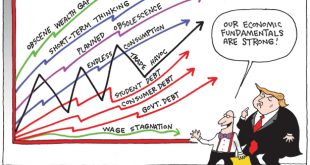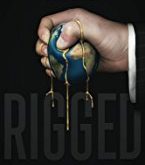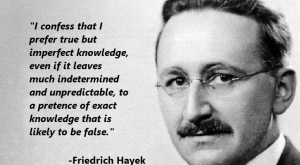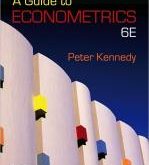from David Ruccio
Read More »Rigged: How globalization and the rules of the modern economy were structured to make the rich richer
from Dean Baker The richest 1% have done extraordinarily well over the last four decades. But income has stagnated for the majority. This was not an accident. It was by design. My book, Rigged, highlights five areas where US policies were deliberately structured to redistribute income upwards. IP laws were strengthened, making patent & copyright monopolies longer and stronger This hugely increased the share of GDP that goes to sectors like pharmaceuticals, medical equipment,...
Read More »Kitchen sink econometrics
from Lars Syll When I present this argument … one or more scholars say, “But shouldn’t I control for everything I can in my regressions? If not, aren’t my coefficients biased due to excluded variables?” This argument is not as persuasive as it may seem initially. First of all, if what you are doing is misspecified already, then adding or excluding other variables has no tendency to make things consistently better or worse … The excluded variable argument only works if you are sure your...
Read More »WEA Commentaries is looking for a co-editor
WEA Commentaries Co-editor required Are you an early- or mid-career economist? Do you have, or wish to develop, links with pluralist economists from around the world? Are you self-motivated, capable of showing initiative, and interested in a wide range of perspectives? If so, we would like to hear from you. Please email [email protected]
Read More »Combatting global warming and austerity
from Dean Baker In the United States, proposals for a Green New Deal have been getting considerable attention in recent months as activists have pressed both members of Congress and Democratic presidential candidates to support aggressive measures to combat global warming. There clearly is much more that we can and must do in the immediate future to prevent enormous damage to the planet. However, major initiatives in the United States to combat global warming will almost certainly require...
Read More »Necessary inventions …
from Lars Syll The quasi-peaceable gentleman of leisure, then, not only consumes of the staff of life beyond the minimum required for subsistence and physical efficiency, but his consumption also undergoes a specialisation as regards the quality of the goods consumed. He consumes freely and of the best, in food, drink, narcotics, shelter, services, ornaments, apparel, weapons and accoutrements, amusements, amulets, and idols or divinities. Thorstein Veblen
Read More »Government-granted patent monopolies are driving up drug prices
from Dean Baker Most of the leading Democratic presidential contenders have put forward a plan to reduce drug prices. But for some reason, none of them have embraced the simple idea of not making drugs expensive in the first place. Specifically, none of the contenders have proposed moving away from the current system of financing the research and development of new drugs through government-granted patent monopolies. The point is a simple one that should be obvious to people in policy...
Read More »The pretense-of-knowledge syndrome in economics
from Lars Syll What does concern me about my discipline … is that its current core — by which I mainly mean the so-called dynamic stochastic general equilibrium approach — has become so mesmerized with its own internal logic that it has begun to confuse the precision it has achieved about its own world with the precision that it has about the real one … While it often makes sense to assume rational expectations for a limited application to isolate a particular mechanism that is distinct...
Read More »Game theory for humans with hearts
from Asad Zaman The following is a slightly revised excerpt of Section 1.2 from my paper on “Empirical Evidence Against Utility Theory“ – Game theorists rule out Humans with hearts by assumption. The excerpt provides some empirical evidence (not needed by anyone except economists) that human actually do have hearts, and this actually affects their behavior! surprise, surprise! The “Goeree-Holt Humans with Hearts” (GHHwH) Game: Conventional game theory operates under the assumption that...
Read More »A guide to econometrics
from Lars Syll 1. Thou shalt use common sense and economic theory. 2. Thou shalt ask the right question. 3. Thou shalt know the context. 4. Thou shalt inspect the data. 5. Thou shalt not worship complexity. 6. Thou shalt look long and hard at thy results. 7. Thou shalt beware the costs of data mining. 8. Thou shalt be willing to compromise. 9. Thou shalt not confuse statistical significance with substance. 10. Thou shalt confess in the presence of sensitivity.
Read More » Real-World Economics Review
Real-World Economics Review






